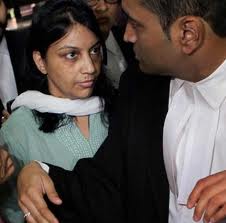
Ghaziabad, May 2: In a major setback for Nupur Talwar in the Aarushi Hemraj murder case, the sessions court of additional district judge Shyam Lal on Wednesday refused to grant bail to her, saying she is an "accused in double murders - of her own daughter and a poor servant - Hemraj".
The court denied bail on the grounds that she may tamper with evidence if granted bail.
On Tuesday, Nupur Talwar's lawyer had sought bail for her saying that she is the mother of the daughter who was killed to which CBI had opposed saying that "a poor servant was also killed and nobody was talking about him".
While pronouncing his order, ADJ Shyam Lal said that Nupur Talwar may scuttle the trial in the case despite an order from the Supreme Court and cause hindrance in the process of law.
The court also observed that "prima facie, you (Nupur) are accused in murder and destruction of evidence".
CBI officials say that it is a big victory for them as Nupur Talwar was evading the law for over one year.
Nupur Talwar is presently lodged in the Dasna Jail, after the court refused to grant her interim bail on Monday.
Her daughter Aarushi and servant Hemraj were found killed in their house on May 16, 2008 after which CBI had first arrested three servants - Krishna, Rajkumar and Vijay Mandal. However, in December 2010 agency filed a closure report in the case and presented evidence against the parents.
On April 27, Nupur Talwar was directed by the Supreme Court to surrender before the trial court in Ghaziabad in the twin murder case of her 14-year-old daughter Aarushi and domestic help Hemraj in Noida four years ago.
Refusing to stay the non-bailable warrant issued against her by the special CBI court, a bench of justices A K Patnaik and J S Khehar asked her to approach the trial judge for bail after surrendering which shall expeditiously consider her plea.
The court also turned down her plea for granting protection against any arrest on her surrender.
"We should not anticipate about what the trial court is going to do. You appear before it and the court shall consider your bail. If you do not get bail then there are higher courts," the bench said.
The bench pointed out that her husband also got bail in the twin murder case.
"We are not inclined to stay the operation of the order of NBW issued by the Special Judge, Ghaziabad. But we direct that petitioner (Nupur Talwar) will appear on Monday and move her bail. In case application for bail is moved, the same shall be considered expeditiously," the bench said.





Comments
Add new comment